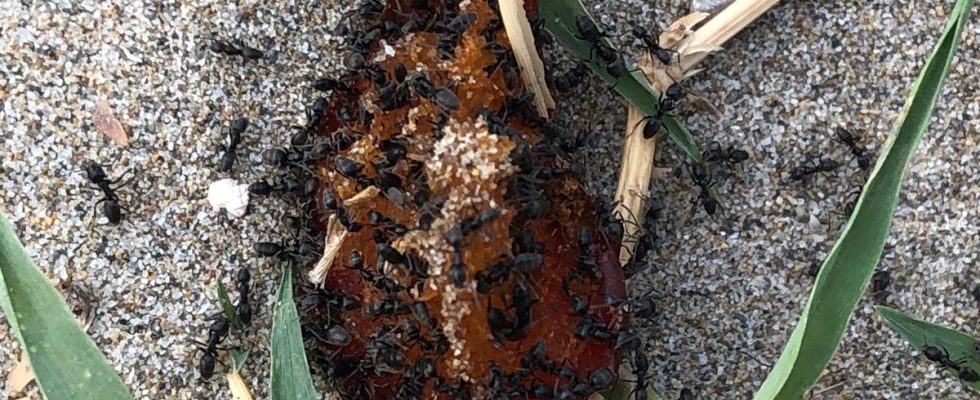In Petit-Travers, in Carnon (Hérault), there are tens of millions, even hundreds of millions. However, we barely notice them, if we don’t pay a little attention to them. But once we see them, we only see them. A “super colony” of ants has taken up residence on this beach, very popular with tourists, not far from Montpellier. For about 600 to 800 meters, they are everywhere. On the sand, in the dunes, on the side of the road, in the parking lot. And even to the edge of the dual carriageway which leads to Grande-Motte.
These tiny ants are from the family of Tapinoma. These are undoubtedly, in Carnon, Tapinoma Darioi, small, annoying and particularly invasive critters, mostly native to Spain. Naughty cousins Tapinoma Magnum, which wreak havoc on agricultural operations, particularly in Corsica. In Carnon, these insects, which reproduce at high speed, also cause damage to the environment, even if they are not visible to the naked eye. Hyperbalezes, the Tapinoma Darioi are in fact taking monumental beatings against other species, which risk, in the long term, disappearing.
These ants pose “a serious ecological problem”
“Ants recognize each other by their body odor,” explains 20 minutes Luc Gomel, ant specialist at Paul-Valéry University in Montpellier, who studies Carnon’s nest closely. “Within the same species, ants normally fight, from one nest to another, because their smell is not the same, because their mother is not the same. Within a “super colony”, they do not attack each other. On the other hand, they devote their energy to fighting against other species. And they manage, in particular, to supplant native ants. This poses a serious ecological problem. » Other insects, but also certain plants, could ultimately be threatened by this “super colony”. Its expansion is therefore closely observed. But for the moment, there is no question of chasing them away.
But bathers can rest assured: for humans, Carnon’s ants are not very bad. Certainly, “they bite quite aggressively,” continues the researcher. But they have no sting or venom. » They are, however, particularly annoying. These ants don’t come out when it’s sunny, and even less so when it’s hot. But when night falls, and there is no wind that could send them waltzing, they willingly venture onto the sand to find food. And that’s hell. “I remember that once, while passing along the path in the dunes, I noticed that piles of ants were climbing on my feet, and even on my legs,” recalls a Montpellier resident. I immediately ran to the sea! »
“I saw people making dams around their towels”
Because of these pesky ants, Petit-Travers is no longer the ideal beach for a picnic in the evening. “They go almost to the edge of the water, when there is a dead crab, or abandoned food, and bring it all back to the anthills,” explains Luc Gomel. I have already seen people, on the beach, making dikes around their towels, to prevent them from getting into pizza boxes or cans. »
We do not know how these ants, which are not in their natural environment on the shores of the Mediterranean, landed in Carnon. They may have arrived there clinging to trees when the coastline was redeveloped. Or is it the fault of a local ant, whose behavior has suddenly mutated, favoring the creation of a “super colony”.

